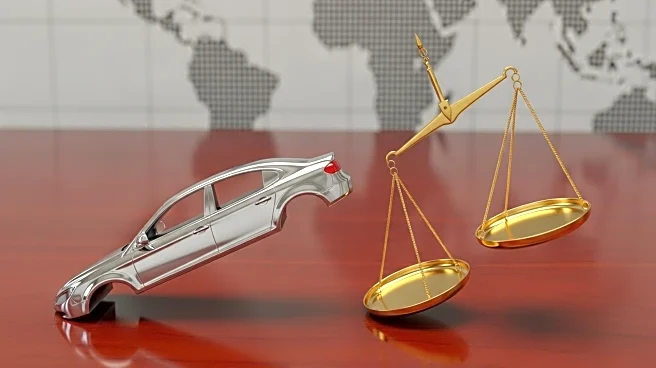What is the story about?
What's Happening?
President Trump has signed an executive order reducing tariffs on Japanese car imports from 27.5% to 15%. This decision follows months of negotiations between the United States and Japan, aimed at easing trade tensions and fostering economic cooperation. The agreement, initially announced in July, is expected to benefit major Japanese automotive companies such as Toyota, Honda, and Nissan by reducing the cost of exporting vehicles to the U.S. market. Additionally, Japan has committed to purchasing $8 billion worth of U.S. goods annually, including agricultural products, fertilizers, and bioethanol. The deal also includes a significant increase in Japan's purchase of U.S.-grown rice by 75%, a concession that Japan had previously resisted to protect its agricultural sector.
Why It's Important?
The reduction in tariffs is significant for both the U.S. and Japanese economies. For Japan, the U.S. is its largest export market, with cars accounting for approximately 20% of its total exports. Lower tariffs will likely enhance the competitiveness of Japanese vehicles in the U.S., potentially increasing sales and market share for Japanese automakers. For the U.S., the agreement aims to reduce the trade deficit with Japan and open new opportunities for American businesses. The commitment from Japan to invest $550 billion in U.S. projects and increase imports of American goods could stimulate economic growth and job creation in various sectors, including agriculture and manufacturing.
What's Next?
The implementation of the new tariff rates is expected to commence shortly, with both countries monitoring the impact on trade flows and economic relations. U.S. businesses may begin to see increased demand from Japan for agricultural and other products, potentially leading to expanded production and export activities. Japanese automakers will likely adjust their strategies to capitalize on the reduced tariffs, possibly increasing their exports to the U.S. market. The broader implications for global trade dynamics remain to be seen, as other countries may seek similar agreements to mitigate the impact of U.S. tariffs.
Beyond the Headlines
The agreement reflects a strategic shift in U.S.-Japan relations, emphasizing mutual economic benefits and cooperation. It may set a precedent for future trade negotiations between the U.S. and other countries, particularly in the context of ongoing global trade tensions. The focus on agricultural imports highlights the importance of this sector in international trade agreements, potentially influencing future policy decisions. Additionally, the deal underscores the interconnectedness of global economies and the need for collaborative approaches to address trade imbalances and promote sustainable growth.















